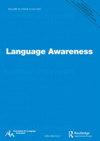The interplay of critical language pedagogy and young Arabic EFL learners
IF 2.2
2区 文学
0 LANGUAGE & LINGUISTICS
引用次数: 0
Abstract
Abstract This paper is based on the first author’s experience of experimenting with critical language pedagogy (CLP) when she was teaching in the UAE. While prior research focuses mainly on the theoretical aspects of CLP, empirical studies on the effectiveness of implementing critical approaches and developing related teaching materials in Arab EFL contexts with young learners are underrepresented. Informed by Paulo Freire’s formulation of ‘culture circles’, this case study reports on the problem-posing literacy practice in a class of Grade 4 female Arabic students in an Abu Dhabi government school—a sample unique to both CLP and case study research. Results indicate EFL learners’ increased capacity for problem posing and motivation for writing, metacognition, and application of prior knowledge during the pre-writing discussion. Findings of this study add evidence-based, practical dimensions to existing critical research, paving the way for like-minded language educators to trial CLP with young learners. ABSTRACT IN ARABIC PLAIN LANGUAGE SUMMARY This study is the fruition of a question that had perplexed and frustrated me as an English teacher of young Grade 4 Arabic learners: ‘How do I increase student talk in a way that is authentic to them, where ideas are discussed openly and earnestly?’ This frustration led me to critical language pedagogy and the work of educator Paulo Freire, and in particular, his formulation of ‘culture circles’ with the rural poor in Brazil. His problem-posing approach where authentic dialogue and conversation was the basis of language learning captivated me. I was fascinated with the idea that such culture circles could work with young learners to encourage unrehearsed and deep conversation, drawing on the experiences of my students in relation to actual issues that troubled them. As we worked through the issue in discussing it, we could together generate some solutions. This paper outlines the way in which we formulated and conducted culture circles for young Arabic EFL learners. Results from this study revealed that giving an increased opportunity for learners to look at a problematised scenario, increased the student’s ability to take different perspectives and voice their own thought processes. We saw an increased desire to write about the problems posed, and the provision of that oral rehearsal of ideas through discussion was evidenced in the students writing. More importantly, this paper is developed with the English language teacher in mind, to document working with younger learners and perhaps guide future studies in the field of critical language pedagogy.批判性语言教学法与阿拉伯青年英语学习者的相互作用
摘要本文基于第一作者在阿联酋教学时尝试批判性语言教学法的经验。虽然先前的研究主要集中在CLP的理论方面,但关于在阿拉伯EFL环境中对年轻学习者实施批判性方法和开发相关教材的有效性的实证研究却不足。根据Paulo Freire对“文化圈”的表述,本案例研究报告了阿布扎比一所公立学校四年级阿拉伯女学生的识字实践问题——这是CLP和案例研究独有的样本。研究结果表明,在写作前讨论中,英语学习者提出问题的能力和写作动机、元认知以及对先前知识的应用都有所提高。这项研究的发现为现有的批判性研究增加了循证、实践层面,为志同道合的语言教育工作者在年轻学习者中试用CLP铺平了道路。作为一名四年级年轻阿拉伯语学习者的英语老师,这项研究是一个让我困惑和沮丧的问题的结果:“我如何以一种对他们来说真实的方式增加学生的谈话,公开认真地讨论想法?”这种挫败感让我想到了批判性语言教育学和教育家保罗·弗雷尔的工作,尤其是他与巴西农村穷人建立的“文化圈”。他提出问题的方法,即真实的对话和对话是语言学习的基础,这让我着迷。我很着迷于这样一种想法,即这些文化圈可以与年轻的学习者合作,鼓励未经学习的深入对话,借鉴我的学生对困扰他们的实际问题的经验。当我们讨论这个问题时,我们可以一起提出一些解决方案。本文概述了我们为年轻的阿拉伯语EFL学习者制定和组织文化圈的方式。这项研究的结果表明,给学习者更多的机会来看待问题化的场景,提高了学生从不同角度看待问题和表达自己想法的能力。我们看到人们越来越渴望写下所提出的问题,通过讨论口头排练想法的做法在学生的写作中得到了证明。更重要的是,本文是在考虑英语教师的情况下编写的,旨在记录与年轻学习者的合作,并可能指导未来在批判性语言教育学领域的研究。
本文章由计算机程序翻译,如有差异,请以英文原文为准。
求助全文
约1分钟内获得全文
求助全文
来源期刊

Language Awareness
Multiple-
CiteScore
3.70
自引率
10.00%
发文量
18
期刊介绍:
Language Awareness encourages and disseminates work which explores the following: the role of explicit knowledge about language in the process of language learning; the role that such explicit knowledge about language plays in language teaching and how such knowledge can best be mediated by teachers; the role of explicit knowledge about language in language use: e.g. sensitivity to bias in language, manipulative aspects of language, literary use of language. It is also a goal of Language Awareness to encourage the establishment of bridges between the language sciences and other disciplines within or outside educational contexts.
 求助内容:
求助内容: 应助结果提醒方式:
应助结果提醒方式:


